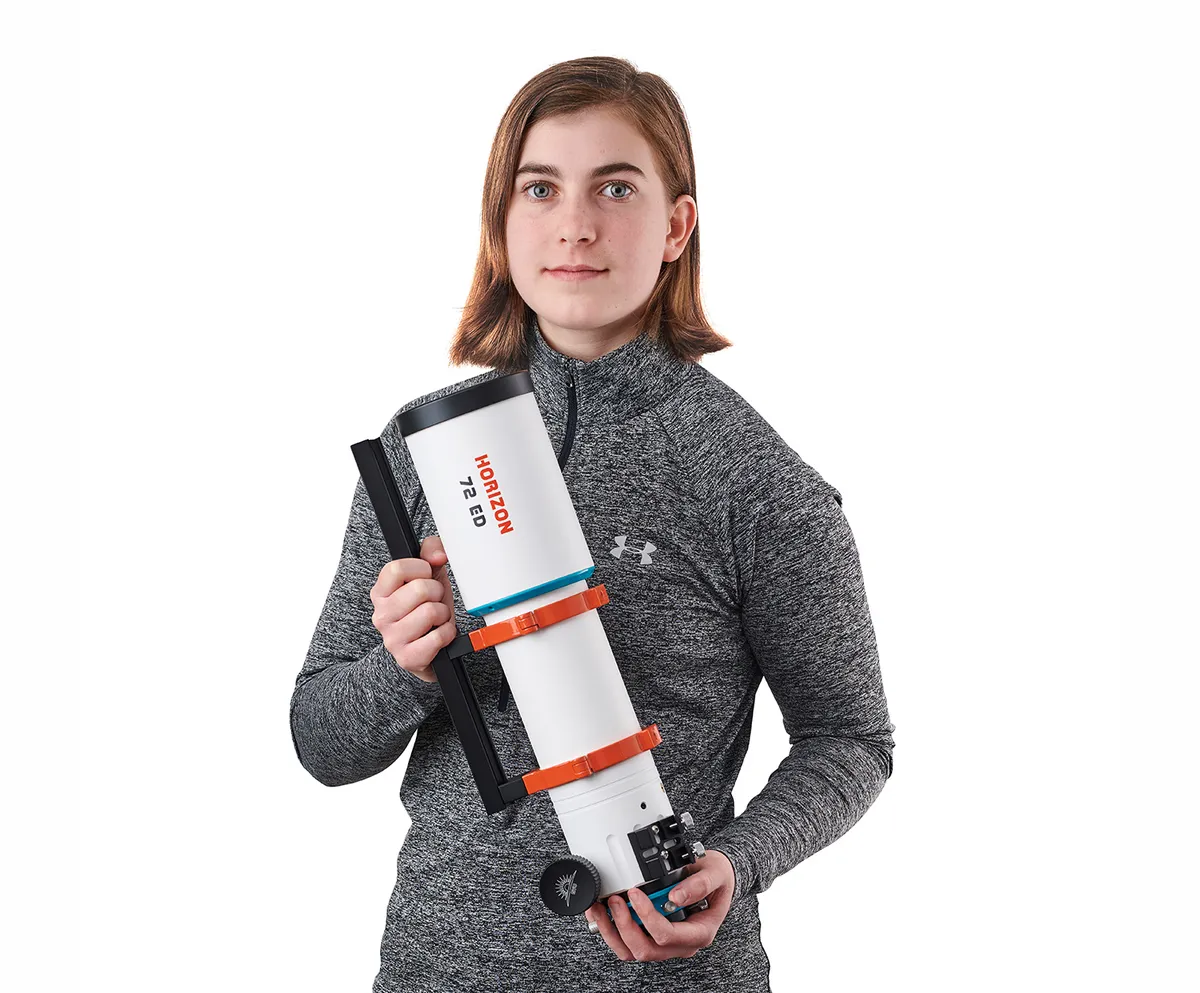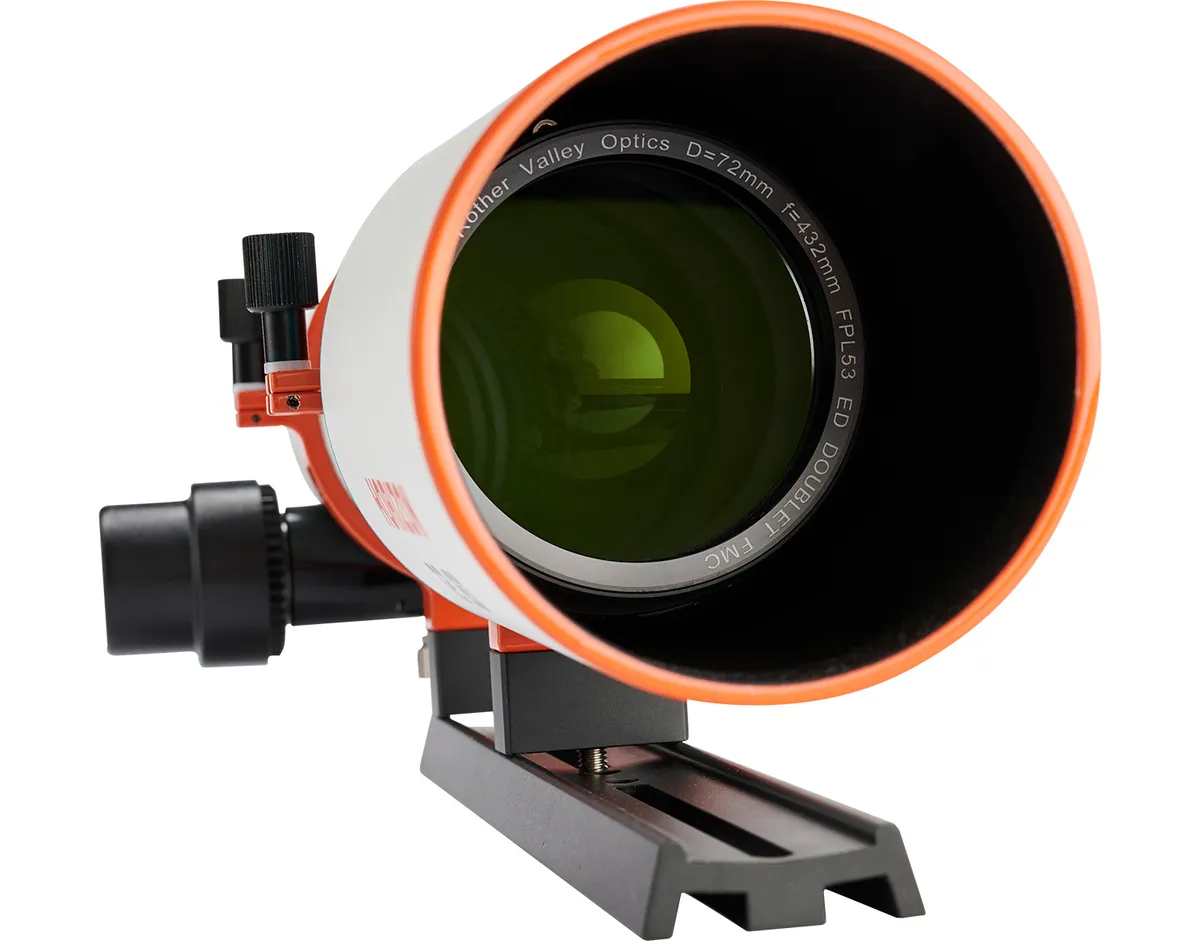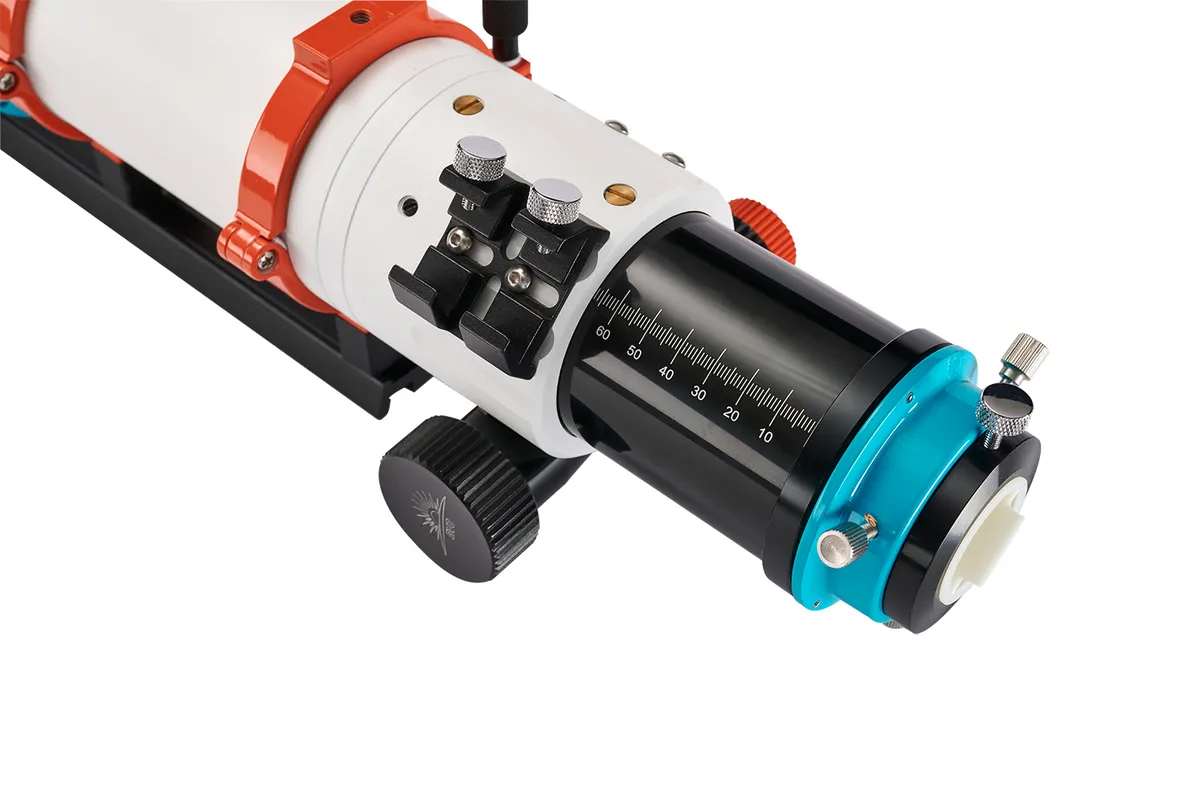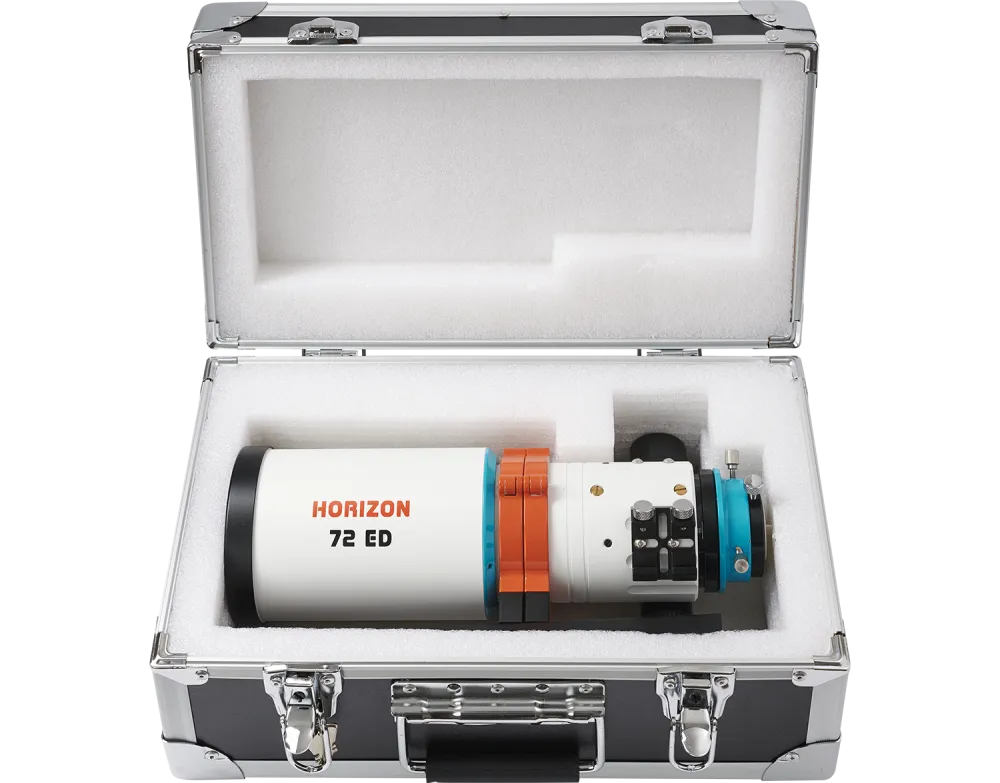Short focus refractors have definitely made their mark, becoming very popular in recent years, and the new RVO Horizon 72ED is set to join them.
The improved performance of such refractors makes them easy to use, quick and simple to mount and ideal for transporting to find better skies, whether it’s for foreign travel or to a nearby dark-sky site. For this reason, they are among the best travel telescopes.
The Horizon 72ED, produced by Rotherham-based Rother Valley Optics, has a 72mm objective doublet lens with a focal length of 432mm, giving a focal ratio of f/6.
The doublet is composed of FPL-53 glass, an extra-low dispersion glass that gives the telescope the ‘ED’ in its name. This helps to correct the slight spread in the wavelengths of light which produces chromatic aberration, or colour fringing, a defect often found in such short focus refractors when they aren’t properly corrected.
The scope and tube rings come in the RVO colours, a stylish white tube with a sky-blue visual back and orange detailing. The orange tube rings are attached to the extra-long Vixen-style mounting bar with small risers, which prevent the focus lock screw catching on the bar.

The basic package consists of the telescope with a visual back that accepts 2- and 1.25-inch eyepieces and accessories, the latter size accommodated by a 2- to 1.25-inch adaptor in black.
Also included is a finderscope shoe and a smaller top Vixen bar, which allows you to mount additional accessories.
Adding a mount of your choice, along with a star diagonal and eyepieces will create a wide-field setup, ideal for taking a visual tour of the Milky Way star fields, or viewing large clusters such as the Coma Star Cluster (Collinder 256) or the Pleiades and the Double Cluster in Perseus.
The 72ED is also sold in a £947 imaging package aimed at deep-sky astrophotographers, which includes a 1.0x rotatable field flattener and a finder/guidescope.
Although the Pleiades wasn’t visible when we had the Horizon 72ED, we enjoyed the rest of our selected targets visually.
In our tests with a 26mm 2-inch eyepiece, at a magnification of 16x, we found the view to be pin sharp out to 80% of the frame. It trailed off slightly towards the edges, but this is expected with such a fast focal ratio.
The colour correction was spot on and, even when we pushed the magnification, we found our views of Albireo – with its gold and sky-blue components – were superb.

Encouraged, we swapped to a trusty 1.25-inch 26mm eyepiece and added our 5x Powermate to push the magnification to 83x, before aiming at the triple star Iota Cassiopeiae, which was low in the northern sky.
We could easily see the further, fainter companion but the closer, brighter component only flickered into view. Increasing the power again we swapped in our 9mm eyepiece to give a magnification of 240x and brought all three components into view.
Dropping back to the 26mm eyepiece, and occasionally the 9mm ocular, we took a deep-sky tour. We can report pleasing views of our targets – including galaxies M81 and M82, the Double Cluster, M52, M11, M39, M17, the Coma Star Cluster, and the Dumbbell Nebula and Ring Nebula.
Now it was time to attach a camera and begin imaging. We wanted to see how the basic telescope performed first, so we used our modified Canon 300 DSLR on the North America Nebula.
Framing it so that the Pelican Nebula was also included, we took 78, 60 second exposures at ISO 1600 and stacked them with 10 dark frames using Astro Pixel Processor.
We were thrilled with the result, but there was some coma towards the edges, which is to be expected with the fast focal ratio of f/6. RVO’s 1.0x rotatable field flattener, which is extra, will correct this optical abberation.
For our next test we tried the scope and camera with the loaned field flattener, taking 119, 60 second exposures of the nebulosity surrounding Sadr in Cygnus, at ISO 1600.
The result was again pleasing, with pin sharp stars at the edges. It backed up our overall impression, that the Horizon 72ED is a cracking instrument for both wide-field observing and imaging.

Travel light
The lightweight, compact design of the RVO Horizon 72ED is impressive. In its stowed collapsed form, with the dew shield and focuser fully retracted, it is only 34cm long.
The optical tube itself weighs just 2.68kg, light enough to hold easily in your hand and easy to remove from the tube rings to adjust position if needed.
These aspects enabled us to use the scope on our Star Adventurer tracking mount, the extra long Vixen mounting bar enabling us to achieve the best balance.
We were then able to take a visual tour of many celestial targets manually without Go-To, with our dielectric star diagonal and a range of eyepieces in the focuser.
We swapped to a GPCAM 290C camera and used a 5x Powermate to capture a video of the triple star Iota Cassiopeiae using the same simple setup.
Only the COVID-19 lockdown stopped us taking the Horizon 72ED to a darker site and enjoying the easy setup without the need for a large mount.

Tube rings
The two tube rings give a firm grip but can be loosened to rotate the tube if needed. They have mounting holes on top for attaching additional equipment such as a guidescope, while below, they sit on a 30cm-long Vixen dovetail bar for attachment to a mount.
Visual back and finder shoe
The visual back comprises a blue 2-inch adaptor with three grub screws that ensure a tight fit to the tube. Three thumb screws hold 2-inch-sized eyepieces and accessories in place. There’s also a black 1.25-inch adaptor to accommodate eyepieces of that size.
Focuser
A rack and pinion type with a 10:1 microfocuser for precise focusing, it has a generous 87mm of travel and a tension adjustment screw underneath. This allows for heavy equipment to be attached and locked, so the focus doesn’t slip during imaging.
Optics
The objective lens is 72mm in diameter with a focal length of 432mm, giving a focal ratio of f/6 – suitable for visual or imaging purposes. A doublet lens made from FPL-53 glass, it is fully multi-coated for good control of colour correction and is mounted in a collimatable cell.
Hard case
The tough, quality aluminium case has a cut-out interior for the telescope. It is lockable and has the RVO Horizon logo emblazoned on the lid. Its handle snaps into place to stop it flopping about, while the case itself is quite lightweight.
Vital stats
- Price £599
- Aperture 72mm
- Focal length 432mm; f/6
- Optical design Fully multi-coated ED doublet lens in collimatable cell
- Mounting Tube rings with 30cm Vixen dovetail bar
- Focuser 10:1 dual speed microfocuser; 87mm of travel
- Weight 2.68kg (OTA)
- Extras Retractable dew shield; 2- to 1.25-inch adaptor; front and back dust caps
- Supplier RVO
- Tel 0190 977 4521
- www.rothervalleyoptics.co.uk
This review originally appeared in the August 2020 issue of BBC Sky at Night Magazine.
